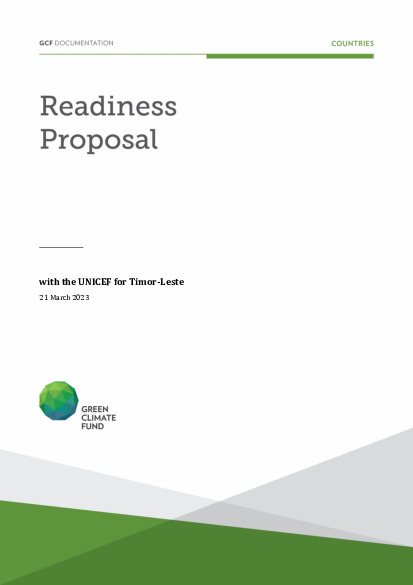Enhancing climate integration capacity for resilient water resource management in Timor-Leste

Enhancing climate integration capacity for resilient water resource management in Timor-Leste
This readiness proposal is developed to address the barriers and gaps in managing climate risks to water resources through the strengthening of climate planning and resilient water resource management capacity in Timor-Leste. The proposal will develop the institutional and technical capacity of national and sub-national institutions for integrating climate change issues into community-based water resource management and increasing climate investments in WASH and water resource management infrastructure and services to better serve vulnerable children and communities. The proposal will generate much-needed data and evidence for establishing the climate rationale for sustainable community-based water resource management and improve communities’ awareness and capacity for enhancing the resilience of water resource management at the community-level. The intended beneficiaries, which will have strengthened capacity for climate adaptation in sustainable water resource management and WASH services, include the newly formed National Authority for Water and Sanitation (ANAS, Auturidade Nacional de Águas e Saneamento) and other relevant government (the environmental health branch of the Ministry of Health and District Health Departments), most vulnerable local communities (including children) and community groups (water management groups and traditional leaders) and private sector entities who have the interest to integrate climate resilience and mitigation in their business models as a market expansion approach. Collaborations will be made with the non-governmental organizations that already have engagement in climate resilience and water supply. The proposal’s ultimate beneficiaries will include the most vulnerable children and communities whose access to water resources and WASH services is increasingly threatened by climate risks. This objective will be achieved under three main outcomes: (1) Relevant country stakeholders (which may include executing entities, civil society organizations and the private sector) have established adequate capacity, systems and networks to support the planning, programming, and implementation of GCF-funded activities; (2) GCF recipient countries have developed or enhanced strategic frameworks to address policy gaps, improve sectoral expertise, and enhance enabling environments for GCF programming in low-emission investment; and (3) Best practices with respect to institutional capacity building and coordination have been developed and disseminated to strengthen engagement by NDAs, DAEs, and delivery partners with the GCF.